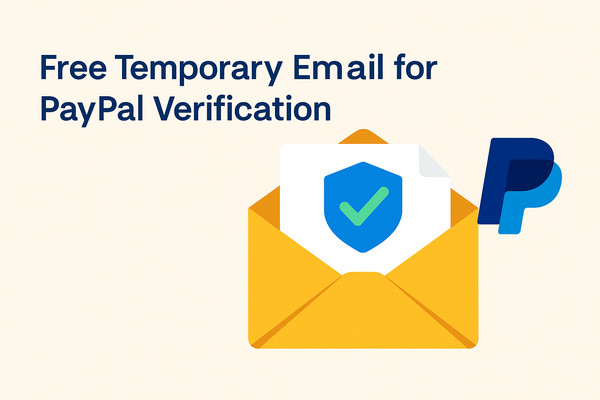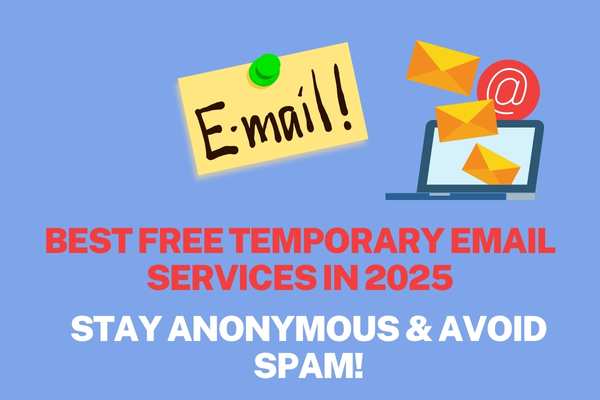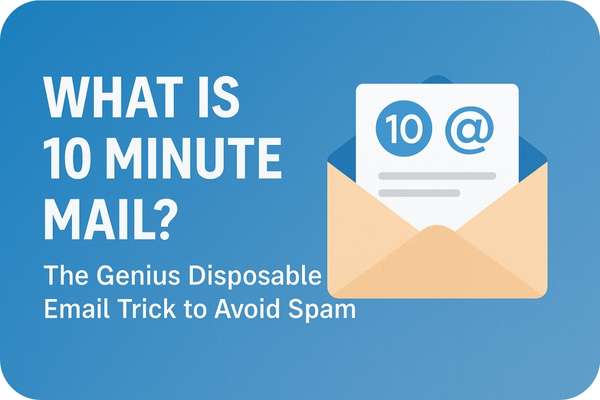Stop Using Your Real Email! Discover the Genius Gmail Trick Everyone’s Talking About

temp inbox mail Gmail Tired of spam clogging your inbox? Learn how to protect your privacy and keep your Gmail clean with this powerful email hack. From Gmail’s hidden alias feature to secure temporary inbox tools, this guide reveals the ultimate methods to dodge spam, manage online sign-ups, and stay anonymous—without sacrificing your main email address. Whether you’re a privacy enthusiast, a tech-savvy user, or just sick of junk mail, this post is packed with practical tips and jaw-dropping tools that’ll change the way you use email forever!
Understanding temp inbox mail gmail
In today’s digital age, our email addresses are gateways to our personal and professional lives. However, with the increasing number of online platforms requiring email sign-ups, the risk of spam and unwanted emails has escalated. Temporary email addresses, often referred to as disposable emails, offer a solution. These are short-lived email addresses that self-destruct after a certain period or after fulfilling their purpose, ensuring your primary inbox remains uncluttered.
1.1 Importance of Temporary Emails
The primary advantage of using temporary emails is the protection of your main email account from spam, phishing attempts, and data breaches. They are especially useful when signing up for online services, downloading resources, or participating in forums where the trustworthiness of the platform is uncertain. By using a temporary email, you can access the required service without compromising your primary email’s security.
2. Gmail’s Built-in Alias Feature
2.1 Using the Plus Sign (+) Method
Gmail offers a unique feature that allows users to create aliases by adding a plus sign followed by any combination of words or numbers before the “@” symbol in their email address. For instance, if your email is “john.doe@gmail.com,” you can use “john.doe+shopping@gmail.com” when signing up for e-commerce sites. All emails sent to this alias will still arrive in your main inbox, but you can set filters to manage them separately.
Read More:-
- You’ll NEVER Believe What This Temp Mail Tool Can Do – Email On Deck Will Blow Your Mind!
- This FREE Temp Mailbox Trick Will Blow Your Mind (Stop Using Your Real Email!)
2.2 Utilizing Periods in Gmail Addresses
Another lesser-known feature of Gmail is its disregard for periods in email addresses. This means “john.doe@gmail.com” and “johndoe@gmail.com” are considered the same. You can use this to your advantage by creating variations of your email address for different purposes, helping you track the source of incoming emails and manage them effectively.
3. Creating Disposable Gmail Addresses
3.1 Steps to Create a Gmail Alias
To create a Gmail alias:
-
Log in to your Gmail account.
-
Click on the gear icon and select “See all settings.”
-
Navigate to the “Accounts and Import” tab.
-
Under “Send mail as,” click “Add another email address.”
-
Enter the alias you wish to use and follow the verification steps.
This method allows you to send emails from the alias, making it appear as a separate email address while still being managed from your primary account.
3.2 Managing Aliases Effectively
Once you’ve set up aliases, it’s crucial to manage them efficiently. Use Gmail’s labeling and filtering features to categorize incoming emails based on the alias they were sent to. This organization ensures that your primary inbox remains focused on essential communications, while other categories handle less critical emails.
4. Setting Up Filters for Temporary Emails
4.1 Creating Filters in Gmail
Filters are a powerful tool in Gmail that automate the organization of your emails. To create a filter:
-
Click on the gear icon and select “See all settings.”
-
Go to the “Filters and Blocked Addresses” tab.
-
Click “Create a new filter.”
-
In the “To” field, enter the alias or temporary email address.
-
Click “Create filter” and choose actions like labeling, archiving, or deleting.
4.2 Automating Email Management
By setting up filters, you can automate the handling of emails sent to your temporary addresses. For instance, emails from a specific alias can be automatically labeled “Promotions” and archived, ensuring they don’t clutter your main inbox. This automation streamlines your email management and enhances productivity.
5. Third-Party Temporary Email Services
5.1 Overview of Popular Services
Several third-party services offer temporary email addresses without the need for registration. Notable ones include:
-
Temp Mail: Provides disposable email addresses that expire after a set time.
-
10 Minute Mail: Offers email addresses that self-destruct after 10 minutes.
-
Guerrilla Mail: Allows users to create temporary emails with the option to extend their lifespan.
These services are user-friendly and ideal for one-time sign-ups or verifications.
5.2 Pros and Cons of Using External Services
Pros:
-
No registration required.
-
Immediate email address generation.
-
Enhanced privacy for short-term use.
Cons:
-
Limited lifespan of email addresses.
-
Potential security risks if sensitive information is received.
-
Emails may be accessible to others if not properly secured.
When using these services, ensure you’re not receiving sensitive or personal information, as the security measures may not match those of established email providers.
6. Security and Privacy Considerations
6.1 Risks Associated with Temporary Emails
While temporary email addresses are incredibly convenient, they come with their own set of risks—especially when using third-party services. One major concern is data visibility. Many disposable email services do not require passwords, meaning that anyone who knows your temporary email address might access the inbox. This becomes particularly risky if you’re receiving login credentials or password reset links.
Another issue is phishing and malware. Because these services often attract people looking to bypass email verification, they can also attract cybercriminals who embed malicious links in emails. Always be cautious and avoid clicking on unfamiliar links in these inboxes.
Temporary inboxes are not encrypted, which makes them highly susceptible to interception. If you’re using them for something more critical than downloading an eBook or signing up for a newsletter, you could be compromising your digital security. In short: never use a temporary email for banking, work-related communication, or anything sensitive.
6.2 Best Practices for Safe Usage
To mitigate the risks, here are a few best practices:
-
Never use temporary emails for long-term or sensitive communication.
-
Clear cookies and browsing history after using a temp mail service to prevent tracking.
-
Use antivirus software to scan downloads received through temp mail.
-
Avoid using the same temp address for multiple sites, especially if they contain personal data.
-
When in doubt, go with Gmail’s aliasing feature, which offers more control and security than a third-party disposable inbox.
Being mindful of how you use these tools will help you get the benefits without falling into common traps.
7. Use Cases for Temporary Emails
7.1 Online Registrations
The most popular use case for temporary inboxes is registering on websites that you either don’t trust or only need for a short time. Whether you’re trying a new service, downloading a whitepaper, or accessing a trial, a temporary email helps you bypass giving out your primary address.
This way, you avoid being bombarded with newsletters, promotional campaigns, and unsolicited offers. Plus, you can keep your real inbox reserved for friends, family, and professional contacts.
7.2 Avoiding Spam
Let’s face it—spam emails are a real nuisance. The more places your email ends up, the more spam you’ll likely receive. Using a temporary or disposable address acts like a digital shield. You can create a new one for every website you’re unsure about, minimizing the risk of spam infiltrating your primary account.
In many cases, websites sell or share email addresses with advertisers. With a temporary email, even if your address gets leaked, it won’t affect your main inbox.
7.3 Testing and Development
If you’re a developer or QA engineer, temp inboxes are pure gold. They’re perfect for testing app registrations, email validation features, or password recovery workflows without cluttering your actual inbox.
For instance, if you’re building a SaaS platform and need to test the user sign-up experience repeatedly, a disposable email address will let you see every step of the process cleanly. You get to validate how your email triggers work and how your app responds to different scenarios without any risk of mixing test data with real data.
8. Limitations of Temporary Emails
8.1 Short Lifespan
By design, temporary emails are not meant to stick around. Most expire within 10 to 60 minutes, and some might stay live for a few hours depending on the provider. This is both a strength and a weakness.
On one hand, it helps with anonymity and privacy. On the other, if you miss an important follow-up email or need to retrieve a link later, you’re out of luck. There’s typically no recovery or inbox history, so timing is everything when using these services.
8.2 Lack of Recovery Options
Unlike Gmail or Outlook accounts that offer password recovery, two-factor authentication, and customer support, temporary inboxes offer none of these. You lose access, and it’s game over. This makes them completely unsuitable for anything beyond the most trivial signups.
Also, many temp email services don’t support sending emails—only receiving them. That means you can’t reply, forward, or initiate conversations, limiting their utility even further. They are read-only inboxes most of the time, which keeps your options very limited.
9. Alternatives to Temporary Emails
9.1 Email Masking Services
Email masking services like Firefox Relay, SimpleLogin, and AnonAddy allow you to create unique email aliases that forward messages to your real inbox. This gives you more control than traditional temp mail services while still keeping your real address hidden.
These services offer additional perks such as:
-
Ability to reply to emails anonymously
-
Long-term alias management
-
Blocking or deleting aliases if they start receiving spam
Unlike traditional temp inboxes, these services are designed for regular use, not just one-time actions.
9.2 Disposable Email Domains
Another alternative is to use a custom domain with email forwarding. For example, buy a cheap domain and set up a catch-all forwarding rule to your Gmail. This way, you can use addresses like netflix@yourdomain.com or promo@yourdomain.com. If one of them gets compromised, just block that specific alias.
This approach offers full control and better branding while retaining the privacy benefits of temp emails. It requires a little setup but gives a lifetime solution compared to the fleeting nature of third-party temp email services.
10. Conclusion: temp inbox mail gmail
10.1 Recap of Key Points
Temporary email addresses are a fantastic tool for protecting your primary inbox from spam, unwanted newsletters, and online clutter. Gmail’s built-in aliasing features offer a secure and long-lasting solution, while third-party services provide fast, no-login-required inboxes for short-term use.
However, with convenience comes risk. Using third-party services for sensitive communication is a bad idea due to lack of security and permanence. Always weigh the pros and cons, and when needed, consider alternatives like email masking or your own custom domain for more robust privacy.
10.2 Final Thoughts
In the end, temporary inboxes are like disposable razors: they get the job done but aren’t built to last. They’re best used sparingly, strategically, and with awareness of their limitations. Whether you’re avoiding spam or testing your latest app, they’re a must-have in your digital toolbox—but not a one-size-fits-all solution.





